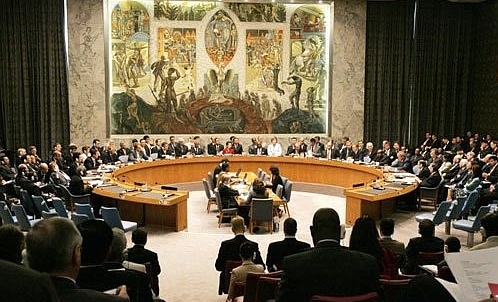Composition and Sessions
The Security Council has primary responsibility, under the Charter, for the maintenance of international peace and security The Council has 15 members. five permanent members---(China, France, Russia the United Kingdom and the United States) and 10 non-permanent members elected by the General Assembly for two-year terms.
Each member of the Council has one vote Decisions on procedural matters are made by an affirmative vote of at least nine . of the 15 members. Decisions on substantive matters require nine votes, including the concurring votes of all five permanent members. This is the rule of ”Great Power unanimity", often referred to as the ”veto” power. All the five permanent members have exercised the right of veto at one time ”or another. If a permanent member does not support a decision but does not wish to block it through a veto, it may abstain from voting.
Under the Charter, all members of the United Nations agree to accept and carry out the decisions of the Security Council. While other organs of the United Nations make recommendations to governments, the Council alone has the power to take decisions which the member states are obligated under the Charter to carry out.
Functions and Powers
Under the Charter, the functions and powers of the Security Council are:
- To maintain international peace and security in accordance with the principles and purposes of the United Nations;
- To investigate any dispute or situation which might lead to international friction;
- To recommend methods of adjusting such disputes or the terms of settlement;
- To formulate plans for the establishment of a system to regulate armaments;
- To determine the existence of a threat to the peace or act of aggression and to recommend what action should be taken;
- To call on member states to apply economic sanctions and other measures not involving the use of force in order to prevent or stop aggression, 7. To take military action against an aggressor, . 8. To recommend admission of new members and the term on . which states may become parties to the Statute of the International Court of Justice;
- To exercise the trusteeship functions of the United Nations in ”strategic areas”
- . To recommend to the General Assembly the appointment of the Secretary-General and, together with the Assembly, to elect the Judges of the International Court.
Relations between the General Assembly and the Security Council
Although the, primary purpose of the Security Council is the maintenance of international peace and security and it is obligated to submit annual reports to the General Assembly on measures taken by it for this purpose, the General Assembly isnot authorised to comment upon the activities of the Security Council in a manner amounting to an assumption of concurrent jurisdiction in the matter of settling disputes. In other words, the Security Council is not subordinate to the overriding authority of the General Assembly.
The Security Council is composed of diplomats and bureaucrats while the General Assembly consists of politicians from nation states. The Security council is almost continuously in session, while the General Assembly meets only in annual sessions or in special sessions called by the Secretary-General, at the request of the ”Security Council or by a majority of its members.
The two organs work in conjunction on matters pertaining to the admission and expulsion of members, appointment of the Secretary-General and election of the Judges of_ the International Court of Justice
The relationship between the two bodies as originally envisaged by the Charter, has been dramatically changed by the passage of the Uniting for peace resolution in 1950. Since this Resolution was passed, the General Assembly has been able to wield wide powers when the Security Council is unable to exercise its primary responsibility for the maintenance of international peace and security, due to lack of unanimity among the permanent members in any case, where there appeared to be a threat to the peace, breach of the peace or act of aggression.

.png)







No comments:
Post a Comment